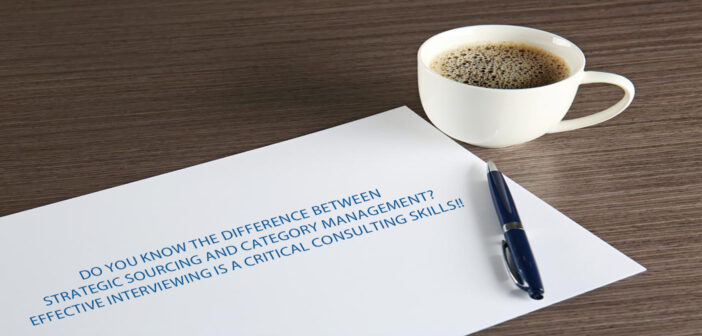At The Mpower Group we have touted for years that Procurement / Supply Chain professionals MUST play the role of an Internal Consultant. To do so, we believe that formal Consulting Skills training is a necessity – similar to the skills that are taught to the Big Four Consultants. The Consulting process has four key steps: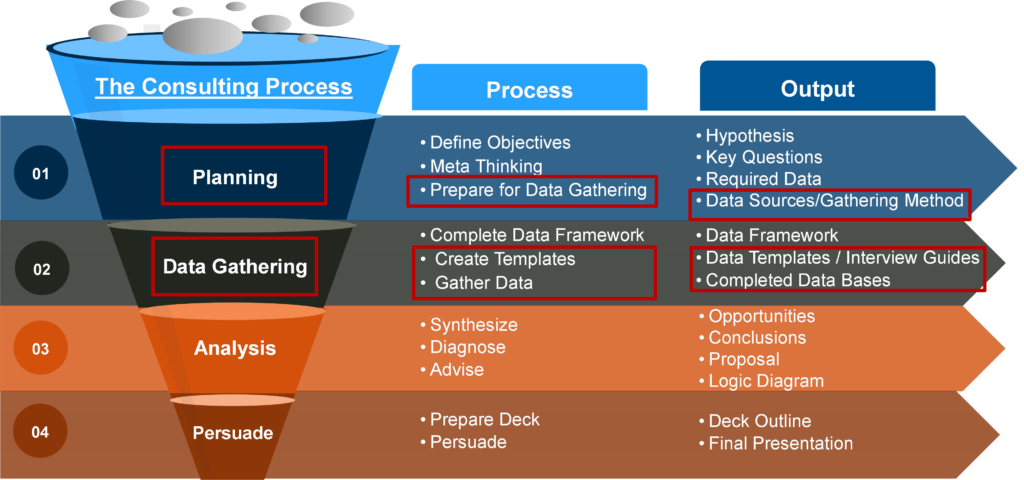
There are three primary methods used to gather data (Data Gathering) :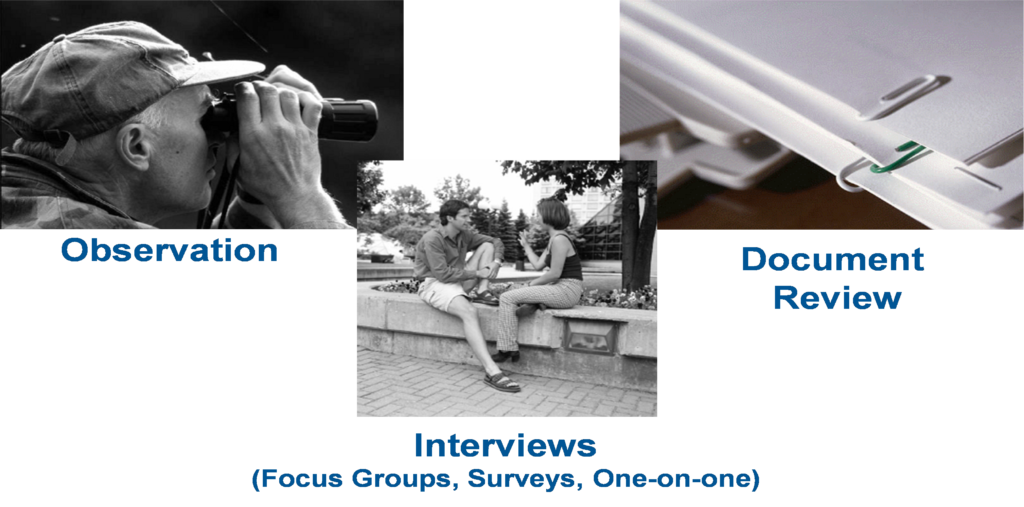
Interviewing is a key skill that we often take for granted and overlook. There is both a “science” to interviewing as well as an “art”. The “art” comes from practice, practice, practice and strong interviewing skills can really set you and your people apart as professionals. The key benefits to interviewing are:
- Opportunity to “sell” yourself & Sourcing / Category Management / Supply Chain
- Create and Develop Relationships
- Allows You to Spot Issues Up Front
- Gather a Lot of Data in a Short Period of Time
While interviewing absolutely has its benefits, it also has risks:
- You may experience significant resistance – and need to be prepared to deal with it
- It could be a waste of time – if you have not chosen the right interviewees OR are unprepared
- Can leave a negative first impression if you have not carefully planned
Preparation and planning is KEY!!! Here are a few elements to consider:
- Review information needs
- category objectives
- issues and hypotheses
- work plan
- Identify interviewees
- Schedule interviews
- Define interview objectives
- Define interview strategy / roles
- Structure the interview guide
- Set standards for interview notes
A major component of planning is the development of an Interview Guide. An interview guide structures and standardizes the interview: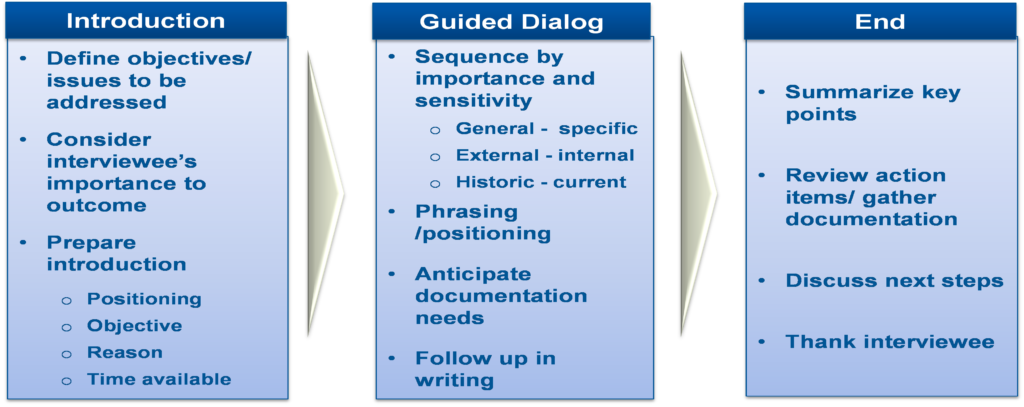
Properly sequencing questions contributes to an effective interview
- Following a natural progression creates a comfortable atmosphere
- Basic to complex
- Current to future
- Neutral to sensitive
- Introducing questions calling for knowledge or specific detail first builds rapport
- Focused and non-threatening
- Easy to answer
- Ask questions the interviewee may be reluctant to answer
- Later in the discussion after you have built rapport and confidence
- Phrased in the third person (e.g., “What are others saying about ABC?”)
The interview itself has three steps that correspond to the sections of the Interview Guide. Each has distinct objectives:
- The Introduction sets the stage
- Establish rapport
- The greeting ritual
- Expression of interest and concern
- Self- disclosure
- Establish position of control
- Satisfy your need for information first
- Willingness to respond to questions
- Establish orientation
- Time frame
- Summary of information being sought
- How the information will be used
- Offer to extend time if necessary
- Get concerns on the table up front
- Establish rapport
- The Guided Dialogue addresses the teams’ specific areas of interest
- Hypotheses tested/validated
- Gather data to answer key questions
- Information captured/confirmed
- Issues identified or addressed
- Insights gained or confirmed
- The Ending confirms your understanding and communicates next steps
- Summarizes your understanding
- Describe what has taken place
- Seek clarification if necessary
- Projects next steps
- Additional interviews?
- Interview results communicated
- Summarizes your understanding
There are four types of questions that can be used during an interview and a successful interview depends on using the appropriate questioning:
- Open
- Closed
- Probing
- Mirroring
Effective questions also require articulation of benefits and supporting rationale for asking the question.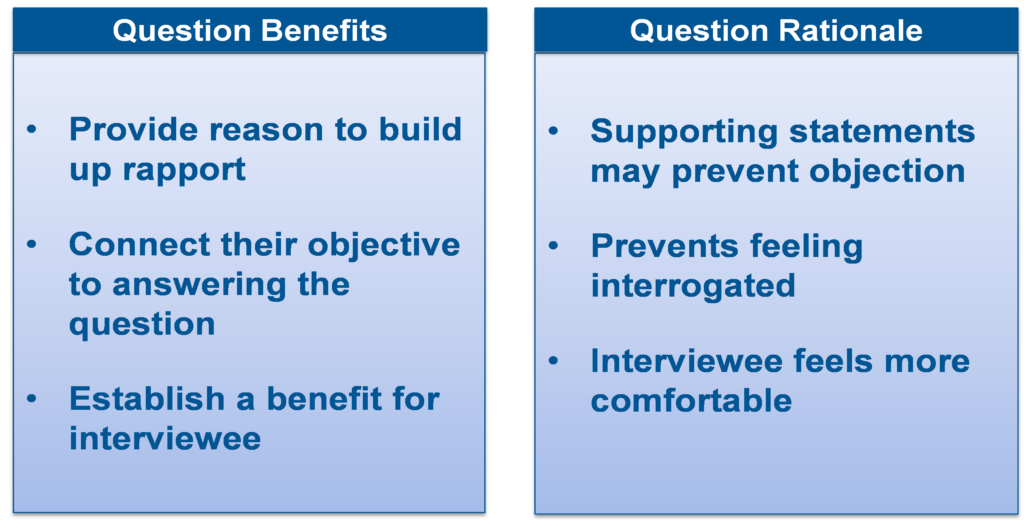
Never, never conduct an interview without an interview guide. It is a critical tool in organizing your thoughts and ensuring that when you walk out of the interview you have gotten the data you need. Remember that interviewing is a Data Gathering method and your primary object is just that – Data Gathering. If you want to be a strong Consultant, you MUST be an Effective Interviewer.
Let us know what you think and join in the conversation . . . . . .

